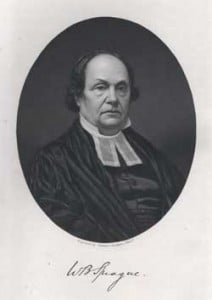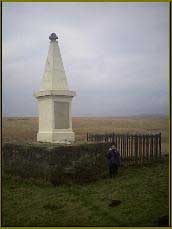A Presbyterian Patriot Pastor
by David T. Myers
One of the Presbyterian pastors who was a decided patriot was the Rev. Alexander McWhorter. Born of Scotch-Irish parents on July 26, 1734, his father was a linen merchant and later a farmer. He was also with his wife, a decided Presbyterian. They had emigrated first to Northern Ireland (Ulster) and then to the American Colonies.
After the death of his father, Alexander at age fourteen moved with his mother to North Carolina to join three brothers there. They attended a Presbyterian church where Alexander was exposed to revival services which left him anxious, it was said. However, he joined the Presbyterian church. Later he would return to New Jersey after the death of his mother. He entered the College of New Jersey and graduated in 1757. Called to the ministry, he studied theology under William Tennent of Log College fame, and licensed to preach by the Presbytery of New Brunswick. After a trip to the New England area, he was called to be the teaching elder at the Presbyterian Church of Newark, New Jersey, where the bulk of his pastoral ministry was to take place. It was during this long pastorate that God’s Spirit led him to have an active role on the battlefield for the independence of the colonies from England in the Revolutionary War.
When General George Washington traveled through Newark on his way to take command of American forces, Pastor McWhorter met him on the way. It would not however be the last time. They were to have many more occasions during this trying time in the history of this new nation. In fact, on one occasion, General Washington asked the Presbyterian pastor to interview two spies which the American troops had captured. The future president asked the Presbyterian clergyman to deal with them spiritually while at the same time to ascertain from them the size and strength of the British forces!
Forced to flee from Newark by British forces who ransacked his parsonage, McWhorter joined the American army as an unofficial chaplain. He was present on Christmas eve when the American army defeated the hired Hession mercenaries in Trenton, New Jersey. After that victory, Pastor McWhorter became the chaplain of Brig. General Henry Knox Continental Artillery Brigade. It was said that every Lord’s Day when Pastor McWhorter was in the pulpit, General George Washington sat under the preaching of our Presbyterian Patriot Pastor! He would serve as an Army chaplain until 1778 when a lightening bolt struck his wife back in Trenton. He hurried home from his Army calling to care for her.
Other than a brief span to pastor a Presbyterian church in Charlotte, North Carolina and be the president of a academy there, the British forces had marked him as an agitator. When they invaded that area of North Carolina, he was forced to flee for his life and lost all his ministerial books in the process. He returned to Newark, New Jersey where he served as a pastor in earlier years until his death in 1807.
Words to Live By: It takes an extraordinary man to have an effective ministry in two spheres of ministry. Certainly one’s congregation has to have a wider view of mission than simply the local one as well. Not many teaching elders have the spiritual gifts to be able to minister effectively in two places of ministry. Our featured figure on this day had those special gifts of ministry. And yet for such a one to be effective, they must have the spiritual help of gifted lay people. How can you help your local pastor in fulfilling more than one calling of ministry in your area? Think prayerfully about it, talk with your pastor of your willingness to use your gifts, and get busy in the work of the Lord.


